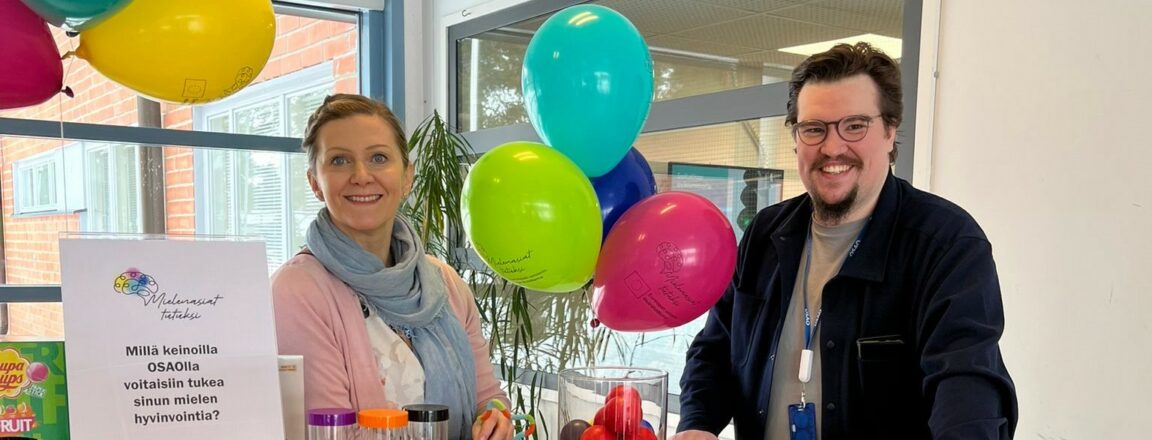
Mental wellbeing in Vocational Education and Training (VET)
Elementti näyttää Voice Intuitiven kuuntelunapin ja translate-valikon
Struggles or undesired behaviours have always a reason behind them. Early recognition of troubles in mental wellbeing and good support system ensures that everyone can be as they are in a safe, caring environment.
Importance of mental wellbeing in Vocational education and training has been widely recognized in Europe. Finnish Institute of Health and Welfare states that about 25% of students have some degree of mental health problems. Neurodivergence is a prevailing trait today.
However, we tend to view it as negative i.e. difficulties carrying out and planning tasks or even as laziness. On the other hand, people with neurodivergent traits can be very enthusiastic and innovative if they are provided with an environment in which they can thrive.
One of the ways Educational Consortium OSAO seeks answers to support student mental wellbeing is through projects. Getting to Know Mental Health project (Mielenasiat tutuksi -projekti) has started at OSAO in autumn 2023 and will be active until the end of July 2026. It is a joint project with OSAO as the main organizer and Oulu University of Applied Sciences as a partner. The goal of the project is to expand the mental health knowledge of teaching staff and students, simplify support paths and find tools that better support all students in their learning.
Getting to Know Mental Health project is divided into five different work packages:
- Supporting learning and increasing understanding
- Increasing the understanding of mental health and neurodivergence i.e. attention deficit hyperactivity disorder (ADHD) can help teachers to understand why a student may behave in a certain way. Providing training and tools to support this is essential in the project.
- Methods to support the student
- Mapping out different methods that are already in use at some units of OSAO and implementing them to other units where applicable.
- Digital guidance
- Including information about mental health and ways of support available to the students in their orientation courses
- Safety nets and co-operation
- Co-operation with student health care and outpatient psychiatric care. Strengthening already existing strong co-operation with OSAO. Simplifying care paths to teaching staff, to ensure guidance to correct services when required.
- Supporting on-the-job learning and further education
- Workplace instructors receive optional training for student guidance in the workplace. The goal of the project is to further develop existing on-the-job learning to support workplace instructions mental health knowledge and ways to support students.
Project is carrying out multiple pilots aimed at supporting mental wellbeing and raising awareness. One of the implemented pilots was Tools for anxiety. This pilot gave students tools to support themselves during anxiety and stress, as well as provided information about anxiety. Normalizing anxiety was one of the pilots’ cornerstones.
Student groups met three times. During the first visit, the students together with the support of the project specialist recognized different situations or factors in their learning environment that cause stress or anxiety. They received short psychoeducation about anxiety; why are we anxious? Why is it normal? How can I ease the feeling?
The second visit consisted of going through these situations in small groups. The aim was to concentrate on other possible outcomes of the situation, instead of the feared one. Furthermore, the discussion and group work also included processing the impact of the feared situation; What’s the worst that could happen? How long would this affect me?
On the third visit, the students received guidance on short mindfulness exercises and short anxiety-reducing exercises that they could do unobtrusively. The presence of group teachers on these visits also teaches the teacher new ways to support students. The teacher may find new tools for teaching when the students face difficult situations. 88% (n=25) of the students reported learning something new about anxiety and ways to control it. In addition, they hoped for more visits with different themes of mental wellbeing.
Feedback from this pilot highlights the importance of supporting student mental wellbeing in our vocational education institutions. By giving students tools to support themselves and strengthening teachers’ mental health skills, we can create a more understanding atmosphere.
The importance of meeting in our educational institutions should not be forgotten, because by meeting students we give them the feeling of being seen and heard. One smile from a teacher can drastically change a student’s day. Let’s build learning environments where every one of us has a chance to thrive.
Contact: Mielenasiat@osao.fi

